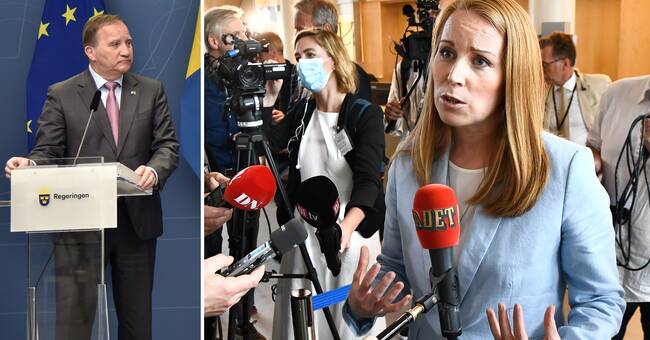Thursday's announcement from moderate leader Ulf Kristersson was expected.
When it became clear that he would not be tolerated by a majority in the Riksdag, it was just as well to throw in the towel.
Instead, it is now Stefan Löfven who will probe the possibilities of forming a government.
It will not be easy either, but there are at least slightly better conditions here.
The Center Party's election decides
Just as after the 2018 election, the Center Party is also this time a decisive player in the government puzzle.
This means that the party will be exposed to severe pressure in the coming days.
If the Center Party also says no to a Social Democratic-led government, there is much to suggest that a by-election is the only way to solve the government crisis.
The Center Party has so far said no to releasing the moderate leader Ulf Kristersson as prime minister.
It was an expected decision.
The Center Party does not want a government that cooperates with the Sweden Democrats.
Thus, Kristersson can not become prime minister.
Releasing Löfven once again, however, is not uncomplicated for the Center Party, which has committed itself firmly to the decision to never negotiate a budget with the Left Party.
As the Liberals have changed sides in the government issue, Löfven must have the support of the Left Party to get a government budget through the Riksdag.
Stefan Löfven has tried to disarm this demand by proposing a solution where he takes over without first having a budget agreement ready.
Thus, he also provides himself with valuable time to try to anchor a budget in the Riksdag.
The Left Party seems to be ready to accept that proposal.
The Center Party has not given any information.
If Annie Lööf also accepts this arrangement, Löfven can reapply as Prime Minister, otherwise a continued locked position in the Riksdag awaits and probably a by-election.
Everything is thus decided by the Center Party.
Uncertain path to the post of Prime Minister
Annie Lööf has said several times that she wants an updated January agreement which also includes the Liberals.
So far, however, there is no indication that the Liberals are on their way back to January cooperation.
Of course, things can still change.
No other party is likely to be more worried about a by-election than the Liberals.
On the other hand, the Liberals would once again turn on the government issue and release Löfven as prime minister, and confidence in the party will fall further.
If the Liberals stick to their line, then it will be the Center Party that finally decides the government issue this time as well.
Stefan Löfven's ability as a negotiator will therefore be put to the test in the coming days.
His dilemma is obvious: The more he compromises with the Left Party, the more difficult it becomes to get support from the Center Party and vice versa.
Both parties are needed for him to be approved as prime minister.
The trick he must manage is to offer the Left Party such great political gains in a budget bill that the party is prepared to vote for the government's budget without having participated in a formal budget cooperation.
How this can happen in a situation where Löfven also needs to give the Center Party political success is not very easy to see.
The Speaker has four attempts to try to get a prime minister appointed by the Riksdag.
Otherwise there will be an automatic by-election.

